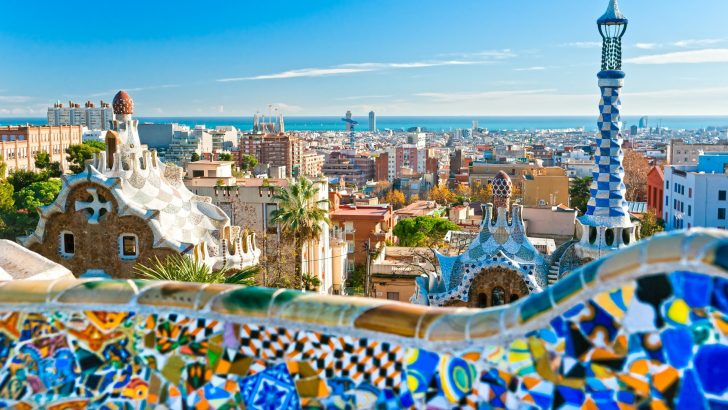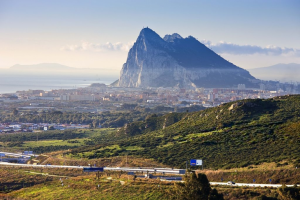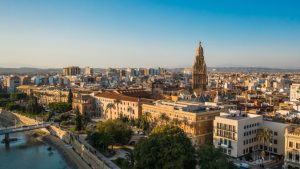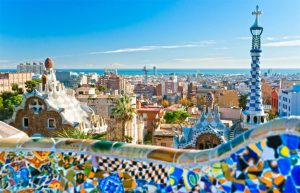 Spain : Safety by City
Spain : Safety by City
Spain, a country on the Iberian Peninsula in southwestern Europe, has a rich history, culture, and geographic features.
Bordered by France and Portugal, Spain has something for every type of traveler, from pristine Mediterranean beaches to snowcapped peaks in the Pyrenees.
Its history is a fascinating resume of influence from the Romans to the Moors to Catholic monarchs — and a patchwork of its architectural, culinary, and other traditions.
Spain is made of several clear regions which possess unique characters. C
Catalonia — the region that is home to the city of Barcelona — is famous for its stunning modernist architecture by Antoni Gaudí, which includes the iconic Sagrada Família.
In the south, you’ll be charmed by flamenco music and historically rich cities like Seville and Granada, where the spectacular Alhambra Palace awaits.
The capital, Madrid, is a lively metropolis replete with excellent museums, vibrant plazas, and a dynamic food scene.
For nature lovers, Spain offers its Costa Brava with its rugged coastline, the vineyards of the La Rioja region, and the volcanic islands of the Canary Islands.
Spain is also known for its festivals, such as the Running of the Bulls in Pamplona and the colorful La Tomatina tomato fight.
Whether you’re traipsing through ancient castles, indulging in tapas in a crowded market, or napping outside in the Mediterranean sunshine, Spain is a fantastic destination for globetrotters.
Warnings & Dangers in Spain

OVERALL RISK: MEDIUM
Spain is a mixed bag of risks, but consider it the high end of low risk or the low end of medium risk. You can decide as we go step by step through the particular issues. However, it's definitely not too risky to visit.

TRANSPORT & TAXIS RISK: LOW
Spain has a low risk when it comes to transport and taxis. Public transportation is reliable and well-maintained, and licensed taxis are generally safe. However, tourists should be cautious of unlicensed cabs and occasional overcharging, especially in busy tourist areas.

PICKPOCKETS RISK: HIGH
The risk of pickpocketing in Spain is high. In fact, this is one of the biggest problems for tourists in the country, especially when visiting Barcelona and Madrid. Don't put anything in your back pockets or leave purses unzipped, particularly in crowded places such as public transport, tourist areas, and famous markets. Assume any stranger who approaches you has an ulterior motive. Don't leave purses or backpacks out of sight at restaurants.

NATURAL DISASTERS RISK: MEDIUM
Spain has a medium risk of natural disasters, with occasional earthquakes, summer wildfires, and coastal flooding. Heat exhaustion in the summer is also possible, especially in Madrid, which is one of the hottest cities in the country.

MUGGING RISK: LOW
The risk of mugging in Spain is relatively low, but it can happen in isolated areas, particularly at night. You are much more likely to be pickpocketed than mugged. Authorities warn that thefts even happen on flights bound for Spain, so don't let your guard down.

TERRORISM RISK: MEDIUM
Spain faces a medium terrorism risk due to past incidents and ongoing threats. You can read about some of the incidents through the U.S. State Department (or your home country's) travel advisory.

SCAMS RISK: MEDIUM
The risk of scams in Spain is medium, with common schemes involving fake petitions, overpriced goods, and distraction tactics. You just can't trust strangers in Spain, as they often work in teams or groups.

WOMEN TRAVELERS RISK: LOW
Aside from the risks that impact anyone, Spain ranks as one of the safest places for women travelers. Use extra caution at night, and stay hyper-aware of your surroundings with so many pickpockets around. Don't enjoy the nightlife alone. Stay with a group or a friend, and don't take drinks from strangers.

TAP WATER RISK: LOW
The risk associated with tap water in Spain is low, as it is safe to drink in most cities and regions. However, in some rural areas, bottled water might be a better option.
Safest Places to Visit in Spain
Go to Spain.info for the official government tourism website.
Under the Plan Your Trip header, there’s a Download Brochures section.
Find the activities that interest you and then download them for free.
In Andalusia, the Alhambra in Granada is a UNESCO-listed palace and fortress with intricate Islamic architecture.
Seville’s Alcázar showcases Mudéjar design, while Córdoba’s Mezquita blends Moorish and Christian influences.
The Costa del Sol features sandy beaches and the Picasso Museum in Málaga.
In Catalonia, Barcelona is home to Gaudí’s Sagrada Familia, Park Güell, and the bustling La Boqueria market.
The Dalí Theatre-Museum in Figueres highlights the surrealist artist’s works, while the Costa Brava offers coastal scenery and medieval villages like Pals.
Madrid, the capital, features the Prado Museum with works by Velázquez and Goya, the Royal Palace, and the expansive Retiro Park.
Nearby, Toledo’s medieval old town and Segovia’s Roman aqueduct showcase Spain’s historical heritage.
In Valencia, the City of Arts and Sciences combines futuristic architecture with museums and an oceanarium.
The region’s beaches and the annual Las Fallas festival add to its appeal.
The Basque Country offers the Guggenheim Museum in Bilbao, known for its contemporary art and striking architecture.
San Sebastián is famous for its beaches and culinary scene, and the Rioja region nearby produces renowned wines.
Galicia, in the northwest, is known for the Santiago de Compostela Cathedral, the endpoint of the Camino de Santiago pilgrimage.
The region’s coastline, including the dramatic cliffs of the Cíes Islands, is another highlight.
Castile and León feature the medieval city of Salamanca with its historic university and the Gothic cathedral of Burgos.
León’s cathedral is noted for its stained-glass windows.
In the Balearic Islands, Mallorca has the Gothic Palma Cathedral, while Ibiza is known for its nightlife and scenic coves.
The Canary Islands offer volcanic landscapes, including Teide National Park in Tenerife.
Several ports in Spain also offer day trips to Morocco.
The ferry between Algeciras and Tangier takes about an hour.
Feel free to read the article I wrote about “How Safe Is Morocco for Travel?” before you book the ticket.
Boat routes also take you to Italy and beyond.
Places to Avoid in Spain
Spain is generally safe and welcoming year-round, but there are a few things to keep in mind when planning your trip.
Some areas of major cities, like Las Ramblas in Barcelona or Puerta del Sol in Madrid, can get overcrowded with tourists, making them prime spots for scams and petty crime, especially in peak summer months.
During festivals like San Fermín in Pamplona or La Tomatina in Buñol, the crowds can be overwhelming, and accommodation prices skyrocket.
If you’re not a fan of extreme heat, it’s best to avoid southern regions like Andalusia and inland cities such as Seville and Córdoba during July and August, where temperatures can easily exceed 40°C (104°F).
On the other hand, some coastal destinations virtually shut down in the off-season, particularly in smaller towns along the Costa del Sol or Costa Brava, with fewer amenities and limited transportation options.
Finally, if you travel to mountainous areas like the Pyrenees or Sierra Nevada in winter, be mindful of weather conditions.
Snowstorms can impact travel and road access.
Safety Tips for Traveling to Spain
- In Spain, you can reach the police by dialing 112 for emergencies, which connects you to all emergency services. For non-urgent situations, the National Police can be contacted at 091, while the local police (Policía Local) are available at 092.
- Download the “My112” app, which provides real-time alerts for natural disasters, accidents, or other emergencies based on your location in Spain. The Spanish government also issues alerts via SMS during critical situations.
- Spanish law requires foreigners to carry identification, and your passport is the most widely accepted form. Police may ask for it at any time, and it’s also essential for checking into hotels or verifying your identity in unexpected situations.
- In beach areas, pay attention to flag systems that indicate water conditions: green means safe, yellow signals caution, and red means swimming is prohibited. Ignoring them can result in fines and serious danger.
- The Mediterranean and Atlantic coasts can experience sudden tide changes and jellyfish blooms, especially in the summer. Lifeguards usually provide updates, but it’s good to check local beach apps.
- We can’t emphasize this enough: Spain’s summers can be brutal, especially in southern regions like Andalusia. To avoid heat exhaustion, stay hydrated, avoid outdoor activities during peak heat hours (2-5 p.m.), and watch for signs of heat exhaustion.
- If you’re renting a car, be aware that speed cameras are widespread, and penalties for violations can be steep. Some cities, like Madrid and Barcelona, have low-emission zones that require special permits.
- Spain has frequent celebrations and demonstrations, particularly in major cities. These can disrupt public transport and crowd control, so check local news or ask your hotel for updates.
- The U.S. State Department urges visitors to only use trusted and vetted tour guides. They claim that several people have reported sexual assault by a tour operator representative named Manuel Blanco Vela, who also goes by Manuel White.
- If you need to bring prescription medications with you, don’t mail them. It’s illegal to ship prescriptions to Spain. Keep medication in its original packaging and ask your doctor to write a prescription in Spanish as well. Spain follows strict regulations on certain drugs, so check with the Spanish consulate or Agencia Española de Medicamentos y Productos Sanitarios (AEMPS) before traveling.
So... How Safe Is Spain Really?
Always check the latest advisories from your government and other major countries, like the U.S., U.K., Canada, and Australia.
That helps you get a more general overview instead of relying on a single authority’s voice.
Civil unrest and terrorism are the biggest concerns for those governments, with the U.S. listing Spain as a Level 2: Exercise Increased Caution.
That’s the second-lowest level on a four-level scale.
Australia also recommends using a “high degree of caution,” which is also just the number two spot on a list of four.
In the first half of 2024, the country experienced a 3% increase in overall crime compared to the same period in 2022.
Notably, there was a 6.9% rise in reported rapes and an 8.3% increase in homicides.
Data doesn’t distinguish locals from visitors, so we can’t get that micro with the information.
It’s also worth noting that Spaniards are upset about the influx of tourists, which topped 94 million in 2024.
Spaniards, especially in hotspots like Barcelona, the Balearic Islands, and parts of Andalusia, are frustrated because tourism drives up rent, pushes out locals, and overwhelms everyday life with crowds and noise.
If you do a Google search for “Spain anti-tourism,” you’ll find plenty of articles about the topic.
Then there are the natural risks, like extreme heat, water hazards, and overexertion.
“The few fatal cases of heatstroke we had last year were among tourists, aged over 50 or 60, who set out on hikes in high summer and got heatstroke,” Héctor Tejero, the head of health and climate change at Spain’s health ministry, told the Guardian in 2024.
Enjoy Spain, but use common sense, protect your stuff, and respect the country and its residents.
How Does Spain Compare?
| Country | Safety Index |
|---|---|
| Spain | 83 |
| Morocco | 54 |
| Netherlands | 75 |
| United Arab Emirates | 79 |
| Montenegro | 70 |
| Qatar | 84 |
| Lithuania | 79 |
| Argentina | 70 |
| Denmark | 94 |
Useful Information

Visas
If you're from the U.S., Canada, or most of Europe, you can visit Spain for up to 90 days without a visa. Planning to stay longer or work? You'll need to apply ahead of time. Rules can change, so it's smart to check with the Spanish consulate before your trip.

Currency
Spain uses the euro (€), and while credit cards are common, cash still comes in handy, especially for small shops or local markets. ATMs are everywhere, and you’ll usually get a better exchange rate there than at currency exchange offices. Just watch out for extra fees from your bank. Just be sure to avoid money changers on the street due to counterfeit concerns.

Weather
Spain’s weather depends on where you go. The south gets blazing hot summers, while the north stays cooler and greener. Coastal areas have mild Mediterranean vibes year-round, but if you're heading to the mountains, expect chilly winters with snow. Always check the forecast before packing.

Airports
Spain has plenty of airports, but Madrid and Barcelona are the biggest hubs. You’ll also find busy ones in Málaga, Valencia, and Seville.

Travel Insurance
Travel insurance is well worth it. Whether it's covering a medical emergency, a canceled flight, or lost luggage, it gives you peace of mind. If you're from the EU, your health card will cover some things, but extra coverage is a good idea, just in case.
Spain Weather Averages (Temperatures)
Average High/Low Temperature
| Temperature / Month | Jan | Feb | Mar | Apr | May | Jun | Jul | Aug | Sep | Oct | Nov | Dec |
|---|---|---|---|---|---|---|---|---|---|---|---|---|
| High °C | 13 | 15 | 18 | 20 | 24 | 29 | 33 | 33 | 29 | 23 | 17 | 14 |
| Low °C | 4 | 5 | 7 | 9 | 13 | 17 | 20 | 20 | 17 | 13 | 7 | 5 |
| High °F | 55 | 59 | 64 | 68 | 75 | 84 | 91 | 91 | 84 | 73 | 63 | 57 |
| Low °F | 39 | 41 | 45 | 48 | 55 | 63 | 68 | 68 | 63 | 55 | 45 | 41 |
Spain - Safety by City
| City | Safety Index |
|---|---|
| Alicante | 77 |
| Andorra la Vella | 89 |
| Barcelona | 67 |
| Bilbao | 52 |
| Cadiz | 74 |
| Canary Islands | 81 |
| Granada | 58 |
| Ibiza | 82 |
| Las Palmas | 74 |
| Madrid | 68 |
| Malaga | 76 |
| Murcia | 83 |
| Palma de Mallorca | 57 |
| Pamplona | 81 |
| Salamanca | 59 |
| San Sebastian | 56 |
| Seville | 71 |
| Valencia | 69 |
| Zaragoza | 79 |












Great culture
I feel like this review of the place is pretty much spot on. Having not been to Spain in several years, I was not sure what to expect when I went earlier this year. It is not as safe as it once was but I didn’t feel there was a threat against me at any point. I went with my husband, my sister, and her husband.
Warm and nice
I migrated from Spain to the US at a young age with my parents. I can’t say that I missed the place having no real deep memories from living there but when I went a few years ago, I did enjoy it. My parents had wanted to go back and visit family since I was 10 but never were able to afford it so I took them back in 2015. We are going to go again next year.
Safe and a pleasure to explore on your own terms
I would never tire of this country! They really take their tourism industry very seriously, everything is spot on, from classic tourist hotspots to hospitality and means of transportation.
Been to Madrid, Barcelona, Sevilla and several other lesser-known cities with Cadaques, Girona being our absolute favorite one. Sevilla will always have my heart, there’s no shortage of activities and it’s not as fast paced as Barcelona which is more of a city focused on younger people. Flamenco show, gorgeous architecture, museums and insanely good food, a must see for anyone who’s never been to Spain.
As with any big city you either can rent a car or resort to uber or lyft.
Their airports are very well organized and clean, you won’t feel like you need to double up on wet wipes when you’re sitting somewhere.
If you practice caution and avoid having all your valuables on display for an easy grab then you won’t have to deal with any other unpleasantries. Pickpockets, mostly gypsies, are rather easy to spot if you’ve traveled around Europe a bit. They tend to appear more in crowded places as in that confusion they will slightly push/bump into you and ease you of your wallet. Otherwise, that’s it. No one will hold you at gunpoint, you won’t get mugged or any other weird scenarios.
For foodies like me this is a dreamy destination, I always end up ordering way more than I need which results in several pounds weight gain when I come back home.
I see myself going on a solo-trip this summer now that covid is taking a break and Spain is definitely my top choice. A whole month of backpacking through this country, at my own pace, without having to worry about my safety, this is the dream especially after these rough couple of years.
Not safe from experience
Many people get mugged at knifepoint in public daylight and even when vigilant. Just because nothing happened to you and you had a great time, doesn’t mean it’s safe.
Spain is not safe and should be rated below 50.
Spain is NOT safe. Everybody i know that have visited including Europeans have been violently mugged or theft happened to them, including myself. Look at the US travel state department website report on Spain and see for yourself. Call the US embassy and ask them, they will have many of negative reports, including assaults. Police dont care and dont do anything. In fact, the police are definitely non existent and their guns are obsolete and a joke. The locals try to blame the morrocans. And taxi drivers will not run their meter.
Spain is a safe, clean, and healthy country.
Spain is safe
I live in the USA and had a house in Spain. I used to go every summer for 4 years and never had one problem! Not sure what happened to you but don’t say it’s not safe just because you were one of the few that got hassled. It’s definitely safer than Los Angeles haha!
Spain is fine in terms of safety
I lived in Spain for many years (actually, I’m visiting now) and never encountered any of that… Are you sure about the country you are talking about?
Other than the usual caution in large cities or tourist areas (like anywhere else in the world! – use your common sense), it is a safe country.
Barcelona is absolutely not safe. I have been robbed or mugged and or randomly attacked 13 times in 2 years with around a 50% success rate for the C**TS… Unfortunately the last time was in my local area and the safest nicest area of them all, El Clot, It broke my heart so much that I vowed to leave Barcelona behind. It’s good for nothing but sunshine in my personal opinion; besides the theft of course. The first day I got there there was an attempt at my phone and the subsequent week another… Leave nothing out in the open and don’t even let strangers walk up towards you because they grab and run.. and they are fast! Do not leave anything on a table and do not go out with things you desire to look after and keep. Back all electronic information up so that you have a copy in case. So if you are like me friendly and trusting – First Barcelona will smash that out of your consciousness for a start – and make sure you have a VERY VERY solid and secure grip upon the things you wish to keep possession of, otherwise its ripped straight from your hand. Be careful of nightclub areas, Plaza Real especially and anything east of “The rambla” – a terrible area, anywhere east or south of Plaza Catalunya. East in this case is much safer than West. Do not leave your things on the beach, basically there is a very good reason why it is the petty crime capital of Europe and possibly even the world. To give this place a safe score I do find quite funny. Aside from the fact that its never a white man or a black man or a homeless man that will rob you. If you don’t look Spanish then you are a target. Men mostly I would imagine; I think its not only a disgusting act I also think they choose the men for there own egos too.
Span is as safe as Germany.
Food is overrated
I don’t know why people wax lyrical about the food. I have travelled from South to North and coming from Scotland , I too came with the spoon feed notion that Spanish was a superior place to visit for good food etc. I can now say after some deep travelling that the food is no better then decent cooked canteen food in the UK. Unlike the UK and prob the US there is next to no great selection of Ethnic Food , Even when you encounter a Chinese restaurant it’s mainly subservient to local tastes and blended down. Spanish foods tends to be over reliant on Potatoes and Night Shades , even though they are huge exporters of spinach you see next to no greens on the plate in a restaurant or other eatery even at the high end. Even for the 21st century the food system seems locked tight into a traditional regime , that probably harked back to a time when food was scarce and people had to make do with limited provisions. However unlike the UK Spain hasn’t moved on from the post war era it seems when it comes to the service of food. Good luck catering for any specific dietary requirements of food intolerances unless you’re going to live in a bubble in Barcelona or Madrid I suppose. Deserts and sweets seem to be locked into the same cycle and I’m not surprised alcohol plays a large part of the culinary experience to stimulate very bland and repetative regimes . When it comes to food. I’m surprised there have not been more jokes about the Spanish (of most regions ) and their over consumption of Potatoes with almost every other dish. Though Spain might be a nation divided at certain points along linguistic lines and other political factors. I’m sure as defenders of the Potato they will always be united in the IP even if Catalonia goes her own way.
A Scotsman criticizing Spanish cuisine? Seriously, is this a joke? It’s not the fault of Spanish cuisine if you chose to always eat at cheap places where fried fish, pork skewers, and croquettes with frozen potatoes are the staples of the menu.
This review speaks much more about its cultural level than about Spanish gastronomy.
Avoid the Canaries
Can’t speak of the mainland, but I would suggest avoiding the Canary Islands. Some rotten piece of trash stole clothing from my luggage. It’s not safe to drink the tap water on any of the islands, and with the possible exception of Tenerife, they aren’t very pretty. Chock full of loud mouth, uneducated, drunken British tourists looking for “quickies”… Find somewhere else to vacation.
I’m from Spain, so I know what I’m talking about.
Spain is no longer as safe as it was a few years ago, DON’T trust people who claim that it’s better now, because it’s false.
We have a lot of issues regarding g*ngs, dr*gs, violence between minors, assaults, theft… It’s getting worse in certain places like Barcelona, I wouldn’t recommend you to visit it. Madrid, too, avoid Tirso de Molina and such places or at least be extremely careful with your belongings. The same happens to Bilbao, Valencia, etc.
However, Spain is a very beautiful country and you can definitely spend a peaceful vacation here, just be careful and avoid certain places (especially at night). Ask locals, spanish people are usually pretty friendly and they can help you. Do your research carefully.